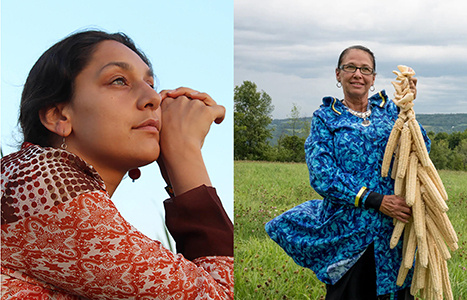Featured

News
Ari Novy named executive director of Cornell Botanic Gardens
Biologist, science educator, will lead the botanic gardens starting March 1st, 2026

In the News
Acres of Natural Beauty: Fascinating Facts About the Botanic Gardens
Have a look at this round up of interesting facts, fun figures, and beautiful images.

Cultural Connection
Winter Solstice Heralds the Return of Light
The winter solstice has a great deal of meaning to human cultures because it is literally about life and death. The cycle of the seasons with life, death, and rebirth is crucial to the survival of all...
Upcoming Events

Event
March 7, 2026:
Spruce Up Your Conifer Knowledge at Brian C. Nevin Welcome Center
Join us for a walk through our conifer collection and Winter Garden to learn the basics of conifer identification and their natural history. The tour will highlight plants...

Event
March 10, 2026:
Knowledge Carriers in Conversation: Angela Ferguson with Táhila Moss at Brian C. Nevin Welcome Center
Join Cornell Botanic Gardens and OJI:SDA' for a live webinar featuring Angela Ferguson (Onondaga) and Táhila Moss (Yoeme, Jewish) as they discuss seed saving and the role that...

Event
March 14, 2026:
Growing Orchids at Home at Brian C. Nevin Welcome Center
Orchids are known for their vibrant colors and unique flowers. They are popular house plants but do need effort in getting them to rebloom. We’ll explore what is needed for...
Connecting plants and peoples for a world of diversity, beauty, and hope.

Cornell University is located on the traditional homelands of the Gayogo̱hó꞉nǫ' (the Cayuga Nation), members of the Haudenosaunee Confederacy.

Cornell Botanic Gardens embraces and actively works to increase diversity among all the communities with which we engage.

News
Medicinal garden at Onondaga Nation School grows opportunityStudents in the Learning by Leading program engaged extensively with the Onondaga Nation School on native plants and design ideas.
Our Gardens and Natural Areas
We are responsible for the natural beauty of the Cornell University campus including cultivated gardens, an arboretum, and natural areas. Together these comprise one-third of campus, and with off-campus natural areas, a total of 3,600 acres.


What to see in winter
Winter provides a season of stillness and quiet beauty throughout our gardens and natural areas. Explore our Winter Garden and collections of plants designed to showcase winter interest.


